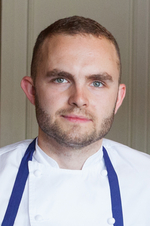Interview with New York Rising Star Sustainability Chef Andrew Whitcomb of Colonie
Caroline Hatchett: How did you get your start?
Andrew Whitcomb: I grew up in rural Maine. My grandparents owned a pig farm. Being involved was always rooted in me. So, I did a stint with Ken Oringer at Earth at Hidden Pond as opening cook. I picked my own herbs there and developed a passion for herbs and using several varieties of heirloom vegetables. I took time off to figure out whether I wanted to be a farmer or be a chef, and did lots of trails. I kept thinking about Colonie and how people’s attitudes were in line with my ideas. I’ve been the head chef for a year now.
CH: Who's your mentor?
AW: Ken Oringer had a big impact on me. He taught me to question everything, and that product knowledge is super admirable. Also, Johnny [Black] at Quince. We keep in touch and he pushes me harder. He asks me the right questions to push myself.
CH: How are you involved in the local culinary community?
AW: We pay our interns, give them two days off in a row, and provide family meals. I do cooking demos at heirloom kitchen. I’m also trying to work on a program to help with school lunches. I work closely with Taste of the Nation and Autism Speaks. I would eventually like to help less fortunate kids, so they can take care of themselves. I would like to have an after school program.
CH: What's your five year plan?
AW: I want to stretch out our farmer network more. I would like to do what Sean Brock did for the South, for the North—bring back vegetables which are going extinct otherwise, start seed savers, work more off the grid somewhere like northeastern Hudson Valley or Western Massachusetts.
CH: Tell me about the restaurant, your philosophy.
AW: I talk to farmers every morning. Working with farmers here, I get to use things I had growing up. It's important for us to preserve the harvest. We make jam and vinegar and don't like to waste anything. We’re trying to be respectful to the environment. I prefer to cook with vegetables, not meat. They're more interesting and better for the environment. For the time being, we do everything in our power to have as much variety as possible. We’re product driven as opposed to technique driven.






